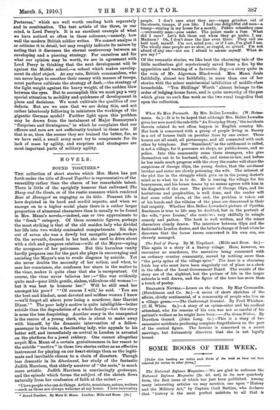NOVELS.
BOUND TOGETHER.•
THE collection of short stories which Mrs. Mann has put forth under the title of Bound Together is representative of the versatility rather than the charm of her remarkable talent. There is little of the sprightly humour that enlivened The Sheep and the Goats, or of the rustic romance which rendered Rose at Honeypot as engaging as its title. Peasant life is here depicted in its hard and sordid aspects, and when we emerge on to a higher social plane there is a rather larger proportion of abnormal characters than is usually to be found in Mrs. Mann's novels,—indeed, one or two approximate to the " freak " category. Of these eccentric figures, perhaps the most striking is that of the old maiden lady who divided her life into two widely contrasted compartments. Six days out of seven she was a dowdy but energetic parish-worker. On the seventh, dressed in her best, she used to drive about with a rich and pompous relation—wife of the Mayor—aping the arrogance of her patroness. But this harmless vanity hardly prepares one for the part she plays in encouraging and assisting the Mayor's son to evade disgrace by suicide. Yet she never doubts the necessity of her action, and when, to ease her conscience, she confesses her share in the matter to the vicar, makes it quite clear that she is unrepentant. Of course, the vicar never believes her :—" She was evidently quite mad—poor little gentle, sinless, ridiculous old woman !- but it was best to humour her." Will he still send her amongst his poor ? " Of course I will,' he said. You are the best and kindest, most devoted and selfless woman I know —we'll forget all about your being a murderer, dear Harriet Dixon.' " The poor lady's motive is quite intelligible—better suicide than the degradation of a whole family—but the story is none the less disquieting. Another essay in the unexpected is the rescue of a young clerk, who is about to make away with himself, by the dramatic intervention of a fellow- passenger in the train, a fascinating lady, who appeals to his better self, and immediately on arrival in London is arrested on the platform for a jewel robbery. One cannot altogether acquit Mrs. Mann of a certain gratuitousness in her resort to the suicide " motive " in these two stories rather as an effective instrument for playing on our heart-strings than as the legiti- mate and inevitable climax to a chain of disasters. Though less dramatic in its decn.ament, her study of the fantastic Judith Harrison, that elderly amateur of " the eerie," is much more artistic. Judith Harrison is convincingly grotesque, and the episode which forms the subject of the sketch flows naturally from her confession of faith at the outset :— " I love people who can do things. Artists, musicians, actors, writers —such as these are always welcome at my house. I love interesting • Bound Together. By Mary E. Mann. London: Mills and Boon. [Gs.] people. I don't care what they are—organ grinders out of the streets, tramps, if you like. I had one delightful old man—a tramp—staying in my house for a month. Public schoolboy once —university man—gone under. The police made a fuss. What did I care? Let's fish them out when they go under, I say. Madmen ? Oh, I don't draw the line even there. They call me half mad, myself. I'm not, mind you ; or if I are, I'm glad I am. The wholly sane people are so slow, so stupid, so afraid. I'm not afraid of any one—nor am I afraid to amuse myself. What do you say ?"
Of the romantic stories, we like best the charming tale of the little motherless girl mysteriously saved from a fire by the apparition and warning of a favourite dog,—a story quite in the vein of Mr. Algernon Blackwood. Mrs. Mann deals faithfully, almost too faithfully, in more than one of her stories with the minor matrimonial infelicities of middle-class households. " Ten Shillings' Worth almost belongs to the order of lodging-house farce, and is quite unworthy of the pen which gives us such fine work as the two rural tragedies that open the collection.














































 Previous page
Previous page